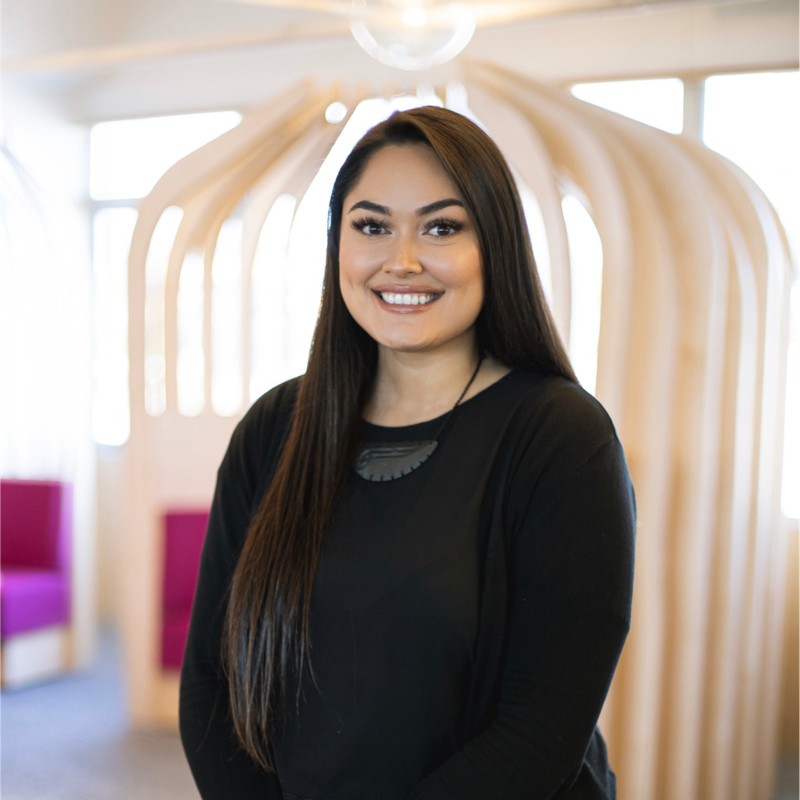 Born in Taranaki, Alicia is the eldest of six tamariki and spent her formative years in Australia, without the influence of Māori culture.
Born in Taranaki, Alicia is the eldest of six tamariki and spent her formative years in Australia, without the influence of Māori culture.
“My parents were very young when I was born. On top of navigating life as young parents, they had little understanding of their own whakapapa or of Māori culture, at least not to the point that they could have passed it down. My learning journey has really been from scratch, and that’s how I ended up doing what I do. I now work in a very culturally focused role, and I absolutely love it.”
Alicia is a descendant of multiple iwi around the motu – Ngāti Porou, Ngāpuhi, Ngāti Maniapoto, and Ngāti Ranginui. After returning to Taranaki at age 20 from Australia, she got a job in retail banking. Over eight years, she worked as a bank teller and compliance assessor, before managing the credit card operations team and working in product management for insurance and KiwiSaver.
During this time, Alicia was on a journey of self-discovery, learning about her whakapapa, marae and turangawaewae through her grandparents, siblings and extended family. “I was very lucky that one of my great uncles had been building my dad’s side of our whakapapa online for a few years, and my nanny would take me visiting our relations to talk with them and look through photos. Having two generations above me still alive is a privilege many do not have, so I utilise that as much as possible.”
Alicia also studied while working in retail banking and, alongside other kaimahi, she eventually started forming the rautaki Māori (Māori strategy). This is how she became part of Tāwhia, the Māori bankers rōpū, and met the team from the Reserve Bank of New Zealand Te Pūtea Matua.
Alicia started her current Senior Advisor – Te Ao Māori role with the organisation in January 2023 and is due to graduate from Massey University with a Bachelor of Arts at the end of this year, majoring in Māori Knowledge. “I’ve been lucky to have had leaders who have pushed me to be the best that I could and supported me in taking up any opportunity to better my experience. I’m so grateful that I could work full time and study part time concurrently. It’s allowed me to put my learnings into practice straight away, which has been really cool – it doesn’t get more convenient than that!”
While her organic on-the-job experience and understanding in finance have been imperative, Alicia says there is a real need for technical training and knowledge in certain roles. “Our core functions at RBNZ of course need formal training; our economics, research and financial stability teams for example. But I don’t want the traditional way of viewing central banking to deter people from getting into this industry because there are so many pathways, and there are so many different types of roles in an organisation like this.”
Alicia’s mum began her banking career as a 28-year-old single parent of four children and has been at the same bank ever since. It’s also common for people to make the switch to a banking role later in life. “I have colleagues and friends who are lawyers, HR people, bankers, executive assistants, researchers…they’re all sorts who have come into our industry and transferred their skills.
One of Alicia’s greatest motivators in her role is working towards a culturally safer workspace for Māori, as well as better outcomes, across all aspects and sectors. “There’s not really a limit to what I mean by that statement. I just love seeing our whānau flourish, and if there’s anything I can do to make that slightly easier or more achievable or more impactful, then I will. I was really lucky that I was always supported by leaders and peers who believed in me and trusted my vision and my priorities, because I know that’s not the case for everyone.”
Increased Māori and Pacific representation in the industry is another strong driving force. “Our workforce really needs to represent the communities we serve – from entry level candidates through to board, governance and executive levels.”
Alicia sees every experience as an opportunity to learn, whether it’s personal or professional. “The more I learn the better I can do my job. For me, it’s about being open minded, knowing that you can always learn more and knowing that you can always improve an environment for the comfort of our peers, regardless of what their background is. Diversity of background and diversity of thought in general, just improves everything we do.”